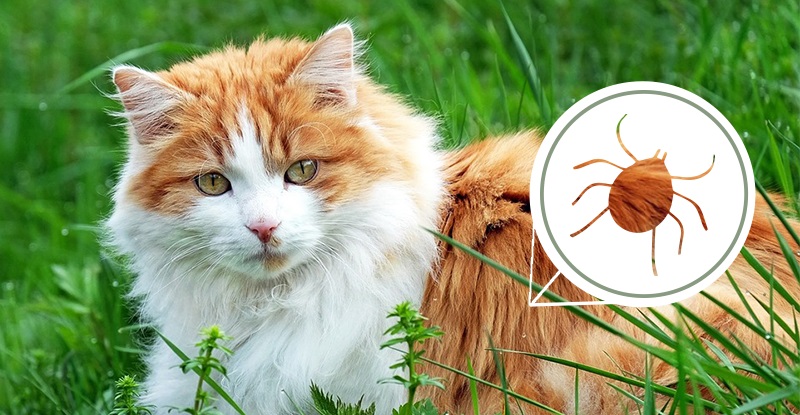
Parasites are organisms that feed on other animals (hosts). Besides causing health issues to their hosts some of them can also transmit diseases. It is important to control parasites in your cat not only for his health but also for yours, since many of them can also affect humans. Factors influencing the prevalence of the different parasites on your cat include your cat’s age, having outdoors access, living with other pets, time of the year and where you live. Owners should be aware that even indoor cats need parasite prevention.
External parasites are found in the hair and skin of cats. The most common ones include fleas, mites and ticks.
All cats are at risk of getting fleas. Fleas will not only cause skin irritation but may also transmit diseases. It is important to know that adult fleas live on the pet’s body but all the other life stages of the flea are spent in the environment. For this reason, if your cat is infested it is recommended to treat not only your cat but also to kill the fleas that may have started developing in your house. Despite thriving in warm temperatures and high humidity, these parasites are active all year. The comfort of our modern heating systems will also contribute to their development in our homes during colder months.
Mites cause irritation of the skin, resulting in itching, hair loss, and inflammation. Mites are common parasites of cats, especially ear mites. These parasites cause significant inflammation and pain and can lead to bacterial infections. If your cat is infested you may notice regular shaking of the head, constant itching of the ears and smelly and dirty ears.
Ticks vary in type and distribution depending on where you live. These parasites wait on tall grass for a host to pass nearby, since they can only crawl and cannot fly or jump. Ticks cause skin irritation and can transmit serious diseases, that threaten your cat’s health.
On the other hand, internal parasites live in your cat’s internal organs. There are two major types of internal parasites that can often affect cats: roundworms and tapeworms.
Cats can acquire roundworms via several routes so even indoor cats are at risk. A large number of roundworms infesting a growing kitten can affect the kitten’s growth, cause serious digestive upsets and be life threatening. Heavily infested kittens have a characteristic increased belly.
Several types of tapeworms may infect cats. These can be acquired through fleas or when cats hunt and eat prey. An infestation can cause vomiting or weight loss.
If your cat is infested with worms you may notice: diarrhoea, visible worms in stool, bloody stool, round appearance of the abdomen, weight loss, vomiting, constipation, itchy bottom or even trouble breathing.
Outdoor cats are particularly prone to get infected by parasites (external and internal) but indoor cats can also get them. Cats that do not receive regular preventive health care are most at risk for developing complications associated with parasites.
There are many different treatments that can protect your pet from internal and external parasites and your vet will be able to advise you on the best product for your pet’s specific case and also the treatment schedule that better suits him or her.
Would you like to know more about cats? Check our Feline Courses:
